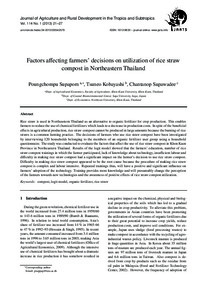Aufsatz

Factors affecting farmers’ decisions on utilization of rice straw compost in Northeastern Thailand
Zusammenfassung
Rice straw is used in Northeastern Thailand as an alternative to organic fertilizer for crop production. This enables farmers to reduce the use of chemical fertilizers which leads to a decrease in production costs. In spite of the beneficial effects in agricultural production, rice straw compost cannot be produced in large amounts because the burning of rice straws is a common farming practice. The decisions of farmers who use rice straw compost have been investigated by interviewing 120 households belonging to the members of an organic fertilizer user group using a household questionnaire. The study was conducted to evaluate the factors that affect the use of rice straw compost in Khon Kaen Province in Northeastern Thailand. Results of the logit model showed that the farmers’ education, number of rice straw compost trainings in which the farmer participated, lack of knowledge about technology, insufficient labour and difficulty in making rice straw compost had a significant impact on the farmer’s decision to use rice straw compost. Difficulty in making rice straw compost appeared to be the root cause because the procedure of making rice straw compost is complex and labour intensive. Repeated trainings thus, will have a positive and significant influence on farmers’ adoption of the technology. Training provides more knowledge and will presumably change the perception of the farmers towards new technologies and the awareness of positive effects of rice straw compost utilization.
Zitierform
In: Journal of Agriculture and Rural Development in the Tropics and Subtropics. Kassel : Kassel University Press. - Vol. 114, No. 1 (2013), S. 21-27Sammlung(en)
Vol 114, No 1 (2013) (Journal of Agriculture and Rural Development in the Tropics and Subtropics (JARTS))Zitieren
@article{urn:nbn:de:hebis:34-2013030542579,
author={Supaporn, Pongchompu and Kobayashi, Tsuneo and Supawadee, Chantanop},
title={Factors affecting farmers’ decisions on utilization of rice straw compost in Northeastern Thailand},
year={2013}
}
0500 Oax 0501 Text $btxt$2rdacontent 0502 Computermedien $bc$2rdacarrier 1100 2013$n2013 1500 1/eng 2050 ##0##urn:nbn:de:hebis:34-2013030542579 3000 Supaporn, Pongchompu 3010 Kobayashi, Tsuneo 3010 Supawadee, Chantanop 4000 Factors affecting farmers’ decisions on utilization of rice straw compost in Northeastern Thailand / Supaporn, Pongchompu 4030 4060 Online-Ressource 4085 ##0##=u http://nbn-resolving.de/urn:nbn:de:hebis:34-2013030542579=x R 4204 \$dAufsatz 4170 7136 ##0##urn:nbn:de:hebis:34-2013030542579
<resource xsi:schemaLocation="http://datacite.org/schema/kernel-2.2 http://schema.datacite.org/meta/kernel-2.2/metadata.xsd"> 2013-08-13T08:34:03Z 2013-08-13T08:34:03Z 2013 1612-9830 urn:nbn:de:hebis:34-2013030542579 http://hdl.handle.net/123456789/2013030542579 eng Kassel University Press Urheberrechtlich geschützt https://rightsstatements.org/page/InC/1.0/ compost logit model organic fertilizer rice straw 630 Factors affecting farmers’ decisions on utilization of rice straw compost in Northeastern Thailand Aufsatz Rice straw is used in Northeastern Thailand as an alternative to organic fertilizer for crop production. This enables farmers to reduce the use of chemical fertilizers which leads to a decrease in production costs. In spite of the beneficial effects in agricultural production, rice straw compost cannot be produced in large amounts because the burning of rice straws is a common farming practice. The decisions of farmers who use rice straw compost have been investigated by interviewing 120 households belonging to the members of an organic fertilizer user group using a household questionnaire. The study was conducted to evaluate the factors that affect the use of rice straw compost in Khon Kaen Province in Northeastern Thailand. Results of the logit model showed that the farmers’ education, number of rice straw compost trainings in which the farmer participated, lack of knowledge about technology, insufficient labour and difficulty in making rice straw compost had a significant impact on the farmer’s decision to use rice straw compost. Difficulty in making rice straw compost appeared to be the root cause because the procedure of making rice straw compost is complex and labour intensive. Repeated trainings thus, will have a positive and significant influence on farmers’ adoption of the technology. Training provides more knowledge and will presumably change the perception of the farmers towards new technologies and the awareness of positive effects of rice straw compost utilization. open access In: Journal of Agriculture and Rural Development in the Tropics and Subtropics. Kassel : Kassel University Press. - Vol. 114, No. 1 (2013), S. 21-27 Supaporn, Pongchompu Kobayashi, Tsuneo Supawadee, Chantanop Gedruckte Ausg. im Verlag Kassel Univ. Press (www.upress.uni-kassel.de) erschienen. </resource>
Die folgenden Lizenzbestimmungen sind mit dieser Ressource verbunden:
Urheberrechtlich geschützt

